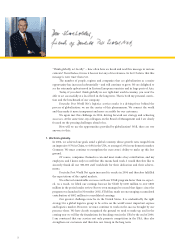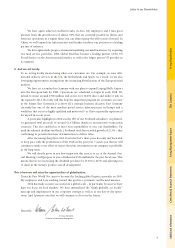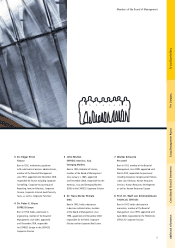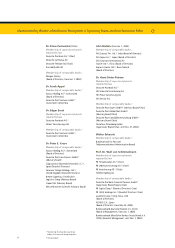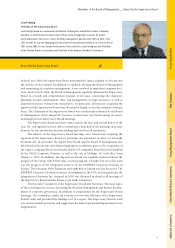DHL 2004 Annual Report Download - page 16
Download and view the complete annual report
Please find page 16 of the 2004 DHL annual report below. You can navigate through the pages in the report by either clicking on the pages listed below, or by using the keyword search tool below to find specific information within the annual report.
Report by the Board of Management and the Supervisory Board on Corporate Governance
Deutsche Post AG’s corporate governance aims to strengthen enterprise value and to promote trust in the manage-
ment and supervision of the company among investors, customers, employees and the public. Finding the right
balance for the division of tasks and responsibilities between the Supervisory Board and the Board of Management
is a material element of responsible corporate governance.
Framework
The statutory framework for corporate governance is governed by German stock corporation law. In addition to
this, the German Corporate Governance Code adopted by the government commission in February 2002 formu-
lated uniform guidelines for German companies that make the existing rules on corporate governance trans-
parent – including for foreign investors. The German Corporate Governance Code is revised at regular intervals
by the government commission and is also adjusted to reflect international developments, among other things.
It was most recently amended in May 2003. The annual Declaration of Conformity issued by Deutsche Post AG
as required under section 161 of the Aktiengesetz (German Stock Corporation Act) is based on the most recent
version, as amended.
Management and supervisory structure
In accordance with German stock corporation law, Deutsche Post AG has a dual management and supervisory
structure embodied in the Board of Management and Supervisory Board as executive bodies. Deutsche Post AG’s
Board of Management consists of eight members, who jointly manage the company. The names of the members
of the Board of Management, their résumés and the allocation of duties within the Board of Management can be
found on pages 4 and 5 of the Annual Report.
The Supervisory Board oversees the management activities of the Board of Management. The Supervisory
Board consists of 20 members, and is composed of an equal number of shareholder and employee representatives
in accordance with the Mitbestimmungsgesetz (German Co-determination Act). The shareholder members of the
Supervisory Board are elected by the Annual General Meeting or, alternatively, appointed by a court until the next
election; the employee representatives are elected in accordance with the Mitbestimmungsgesetz. Seven employee
members of the Supervisory Board are employees of the Group, and three are external union representatives. The
names and professions of the members of the Supervisory Board are presented on page 9 of the Annual Report.
Mandates held by members of the Board of Management and the Supervisory Board in the supervisory bodies of
other companies are listed on pages 6, 10 and 11 of the Annual Report.
The cooperation between the executive bodies is defined by the company’s Articles of Association as resolved
by the Annual General Meeting, the by-laws of the Supervisory Board and the Board of Management, as well
as by the resolutions of the executive bodies within the framework of the relevant statutory provisions. These
measures determine the subjects and scope of reporting by the Board of Management to the Supervisory Board,
and which business of the Board of Management requires the approval of the Supervisory Board. The matters
addressed by the Supervisory Board in fiscal 2004 are contained in the Report by the Supervisory Board on pages
7 and 8 of the Annual Report.
Committees
The Supervisory Board has formed committees. The Executive Committee deals with Board of Management matters,
such as preparing for the appointment of board members, the conditions of board member contracts, and the
approval of the members’ outside activities. The Personnel Committee discusses the company’s human resources
policies, as well as the principles and structures of human resources development and personnel planning. The
Finance and Audit Committee concerns itself firstly with the capital expenditure and financing measures to be
approved by the Supervisory Board. On the other hand, it supports the Supervisory Board in the areas of account-
ing and auditing, and engages the auditors elected by the Annual General Meeting. The activities of the Mediation
Committee are governed by section 27 (3) of the Mitbestimmungsgesetz.
The composition of the Committees is presented on page 11 of the Annual Report.
12


